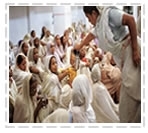 |
| Dr. Zeda Rosenberg (ipm-microbicides.org) |
AIDS isn't like other diseases. You don't contract it from a mosquito bite or from stepping on a rusty nail. You don't contract AIDS because someone sneezed on you at the movies. In the majority of cases, AIDS is contracted via sexual intercourse. Among its contributing factors are promiscuity, unsafe sex and rape. All this complicates fighting the disease. Because AIDS isn't just deadly; it's ugly.
 |
| Women living with AIDS in Africa (dfid.gov.uk) |
Luckily, Dr. Zeda Rosenberg isn't afraid to look. And not just at the disease, but at its victims; at the day-to-day reality of AIDS, how it's transmitted and who's at greatest risk. In a scientific establishment set on nothing short of a cure, Dr. Rosenberg, the chief executive of the International Partnership for Microbicides has been a pragmatic voice in support of prevention. For years, she's tirelessly voiced her belief that, until a vaccine exists, a lot more can be done for the AIDS pandemic's most vulnerable victims - women. And now, as we enter our third decade without successfully developing an AIDS vaccine, it seems that same establishment is ready to listen.
In most of the third world, HIV is transmitted primarily through heterosexual relationships. This makes women particularly susceptible to infection. For these women, their culture is at least partly to blame. Women in many parts of Africa and Asia are allowed considerably less say in their own lives and, as a result, are left vulnerable to a spouse's unsafe sexual practices.
 |
This is where Dr. Rosenberg believes a significant difference can be made in fighting the spread of AIDS. By developing a topical microbicide to kill HIV in the vagina before the virus can attack target cells, Dr. Rosenberg and IPM will empower women to protect themselves even with spouses who refuse to wear condoms. The resulting number of saved lives is no less than staggering. It is estimated that even a partially effective microbicide could prevent 2.5 million HIV infections over a period of three years. With numbers like that, it's hard to believe topical microbicides for women aren't widely available yet. Dr. Rosenberg points out that the idea of microbicides has been around for some time. "...since 1989, when a number of women's activists and others thought that progress on the H.I.V. vaccines weren't moving as quickly as everyone hoped it would." The struggle to make microbicides widely available has been a source of frustration for her. "...all this time has gone by and one can't help but wonder if perhaps there were intermediary steps that could have been taken, that may not be as all-encompassing as a 100 percent effective vaccine but that might have helped save many women's lives. I say women because it was clear 10 years ago that the epidemic was going to be in women." This prediction has come to pass in Sub-Saharan Africa where AIDS is ravaging the population and women account for 57% of all infected adults.
 |
| AIDS widows in India (widowsrights.org) |
After years of pushing for readily available microbicidal gels and creams for women, it appears that Dr. Rosenberg is finally on the brink of making her vision a reality. In March of 2004, IPM signed an agreement with the Johnson & Johnson subsidiary, Tibotec Pharmaceuticals Ltd., to develop one of the company's HIV inhibitor compounds as a microbicide. Then in a precedent-setting joint announcement, two of the world's leading pharmaceutical companies, Merck Inc. and Bristol-Myers Squibb announced on October 31, 2005 that they're joining in the fight. Merck and Bristol-Myers Squibb have granted IPM the right to develop, manufacture and distribute their antiretroviral compounds, royalty-free, to be used as microbicides in financially-strapped countries. "These historic agreements mark a turning point in the pharmaceutical industry's commitment to developing a safe and effective microbicide to protect women from HIV," said Dr. Rosenberg.
 |
| Hope lives in Africa (http://aids-children.org) |
Certainly, there are countless heroes in the fight against AIDS. Heroes in laboratories, in hospitals, and in graves, who have given and continue to give their best. Still, it's unclear who, if anyone, would have championed microbicides for HIV protection if not for Dr. Zeda Rosenberg. One thing is sure: Without her willingness to look at the facts on the ground, to assess the disease for what it is and what we can do to fight it now, with the resources we already have, this long, drawn-out battle would surely prove to become even longer. Even deadlier. Even uglier.
On behalf of those yet to be saved, I'd like to say thank you, Dr. Rosenberg. You are our hero.
Page created on 11/15/2011 4:38:24 PM
Last edited 5/13/2020 5:42:47 AM
BIO OF DR. ZEDA ROSENBERG
Dr. Rosenberg is responsible for providing vision, leadership and direction to IPM. Previously, Dr. Rosenberg was the Scientific Director for the HIV Prevention Trials Network (HPTN) at Family Health International from 1999 to 2002. In this capacity, she assured scientific and operational coordination for clinical trials in the areas of prevention of mother-to-child, sexual and intravenous drug use transmission of HIV both domestically and internationally. From 1995 to 1999, Dr. Rosenberg was Senior Scientist in the Division of AIDS, National Institute of Allergy and Infectious Diseases (NIAID) at the National Institutes of Health (NIH). In that capacity, she was the principal staff person responsible for HIV prevention clinical trials, providing leadership and direction for the planning, implementation, administration and evaluation of a global program of extramural research on the prevention of HIV transmission in adult populations.
Dr. Rosenberg was also Assistant to the Director and then Assistant Director for Prevention Research at NIAID from 1987-1995. In this position, she was responsible for all scientific research areas related to AIDS, functioning as a liaison and facilitating scientific exchange between intramural research laboratories and the office of the Director. She also coordinated the NIAID Tuberculosis (TB) Research effort, representing NIH on the Public Health Service Task Force to Combat Multi-Drug Resistant TB and co-chairing the TB Research Subcommittee.
In addition, she was responsible for the coordination of other Institute prevention activities, including the prevention of HIV infection and other sexually transmitted diseases. Dr. Rosenberg received her undergraduate degree (A.B.) in biology and mathematics from Douglass College, Rutgers University; a master's degree (S.M.) in epidemiology and a doctoral degree (Sc.D.) in microbiology from the Harvard School of Public Health.
